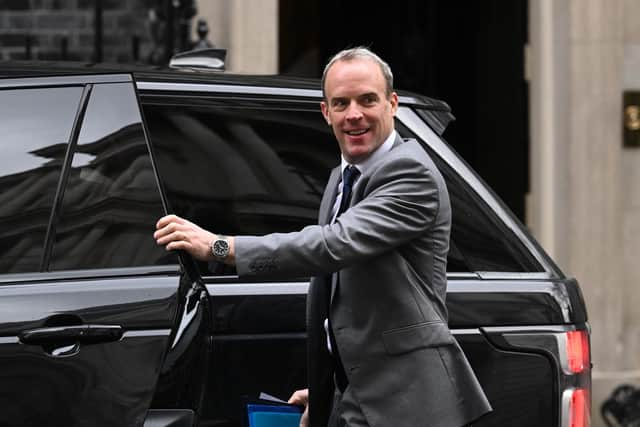Dominic Raab's resignation gives SNP welcome respite but party's dominance of Scottish politics could be over – Ian Swanson
and live on Freeview channel 276
Dominic Raab provided the SNP with a brief respite from the relentless headlines about their missing money and a welcome reminder that other parties have issues too. The erstwhile Deputy Prime Minister's resignation, while everyone was waiting to see whether Rishi Sunak would sack him, came after an official report found he bullied civil servants by acting in an aggressive and intimidating manner.
Officials from three different departments had given evidence about his treatment of them. But Mr Raab showed no remorse and instead launched a furious defence of his conduct and made wild claims about "activist" officials trying to block government policy.
Advertisement
Hide AdAdvertisement
Hide AdHis departure from the Cabinet probably marks the end of his political career – he is predicted to lose his seat to the Lib Dems at the next general election. But it does not mean the bullying scandal in the UK Government is over.


We have seen Priti Patel allowed to stay on as Home Secretary by Boris Johnson despite bullying allegations being upheld, then Gavin Williamson forced to quit over bullying claims just weeks after being appointed to Cabinet by Rishi Sunak. And there have been suggestions that Mr Raab's case could trigger complaints concerning three other ministers. It looks like a disturbingly common problem which successive Prime Ministers have been unwilling to tackle.
But Mr Raab’s demise did not push the SNP’s troubles out of the picture for long. New lines on the story emerged in the Sunday papers – including police interest in burner phones, jewellery, pots and pans, and a fridge freezer. And speculation resumed about the investigation and whether, after former chief executive Peter Murrell and ex-treasurer Colin Beattie were each arrested, questioned and released without charge, former First Minister Nicola Sturgeon could be next.
Meanwhile, Humza Yousaf made a valiant attempt to carry on with normal government, outlining to parliament his priorities for the next three years until the Holyrood elections. In normal times, his programme would have dominated the headlines, not least because it represents a major reset on several key policies, including a delay to both the deposit return scheme (DRS) and the legislation for a National Care Service, and going back to the drawing board on proposed alcohol advertising restrictions.
Advertisement
Hide AdAdvertisement
Hide AdThere were other eye-catching initiatives too – the removal of peak ScotRail fares from October in a six-month trial and pledging to double the number of electric vehicle charging points. All of these are significant moves with the potential to improve relations with business, convince critics the government is listening and win public support. But circumstances make the going tough.
The new First Minister won the SNP leadership contest only narrowly over an opponent who was more popular with the public and his task in reuniting the party is already difficult. But faced with the extraordinary events which have unfolded in recent weeks he has an almost impossible job to focus attention away from the party and onto what the Scottish Government is trying to do.
The SNP has already slipped in the polls and although it is still ahead, Labour is gaining ground. The crisis engulfing the SNP does not spell the end of the party, but it does mean its days as the unchallengeable dominant force in Scottish politics could well be over.
Comment Guidelines
National World encourages reader discussion on our stories. User feedback, insights and back-and-forth exchanges add a rich layer of context to reporting. Please review our Community Guidelines before commenting.